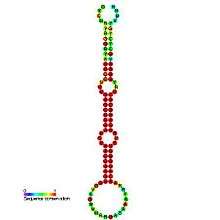mir-218 microRNA precursor family
| mir-218 microRNA precursor family | |
|---|---|
 | |
| Predicted secondary structure and sequence conservation of mir-218 | |
| Identifiers | |
| Symbol | mir-218 |
| Rfam | RF00255 |
| miRBase | MI0000294 |
| miRBase family | MIPF0000026 |
| Other data | |
| RNA type | Gene; miRNA |
| Domain(s) | Eukaryota |
| GO | 0035195 0035068 |
| SO | 0001244 |
miR-218 microRNA precursor is a small non-coding RNA that regulates gene expression by antisense binding.
miR-218 appears to be a vertebrate specific microRNA and has now been predicted and experimentally confirmed in a wide range of vertebrate species.[1] The extents of the hairpin precursors are not known. In this case the mature sequence in excised from the 5'arm of the hairpin.
miR-218 is specifically expressed by mammalian motor neurons during embryonic development into adulthood, and motor neurons lacking expression of miR-218 exhibit hyperexcitability, neuromuscular junction failure, and neurodegeneration, as demonstrated by knockout mouse models [2].
The involvement of miR-218 in cancer has also been investigated. miR-218, along with miR-585, has been found to be silenced by DNA methylation in oral squamous cell carcinoma.[3] It is also downregulated in Nasopharyngeal carcinoma, with artificially-induced expression serving to slow tumour growth.[4] miR-218 has also been found to have tumour suppressing qualities in bladder cancer cells.[5]
References
- ↑ "miRNA gene family: mir-218". mirBASE. The University of Manchester.
- ↑ Amin, ND; Bai, G; Klug, JR; Bonanomi, D; Pankratz, MT; Gifford, WD; Hinckley, CA; Sternfeld, MJ; Driscoll, SP; Dominguez, B; Lee, K; Jin, X; Pfaff, SL (Dec 18, 2015). "Loss of motoneuron-specific microRNA-218 causes systemic neuromuscular failure.". Science 350 (6267): 1525–29. doi:10.1126/science.aad2509. PMID 26680198.
- ↑ Uesugi, A; Kozaki, K; Tsuruta, T; Furuta, M; Morita, K; Imoto, I; Omura, K; Inazawa, J (Sep 1, 2011). "The Tumor Suppressive MicroRNA miR-218 Targets the mTOR Component Rictor and Inhibits AKT Phosphorylation in Oral Cancer.". Cancer Research 71 (17): 5765–78. doi:10.1158/0008-5472.CAN-11-0368. PMID 21795477.
- ↑ Alajez, NM; Lenarduzzi, M; Ito, E; Hui, AB; Shi, W; Bruce, J; Yue, S; Huang, SH; Xu, W; Waldron, J; O'Sullivan, B; Liu, FF (Mar 15, 2011). "MiR-218 suppresses nasopharyngeal cancer progression through downregulation of survivin and the SLIT2-ROBO1 pathway.". Cancer Research 71 (6): 2381–91. doi:10.1158/0008-5472.CAN-10-2754. PMID 21385904.
- ↑ Tatarano, S; Chiyomaru, T; Kawakami, K; Enokida, H; Yoshino, H; Hidaka, H; Yamasaki, T; Kawahara, K; Nishiyama, K; Seki, N; Nakagawa, M (July 2011). "miR-218 on the genomic loss region of chromosome 4p15.31 functions as a tumor suppressor in bladder cancer.". International journal of oncology 39 (1): 13–21. doi:10.3892/ijo.2011.1012. PMID 21519788.
External links
| ||||||||||||||||||